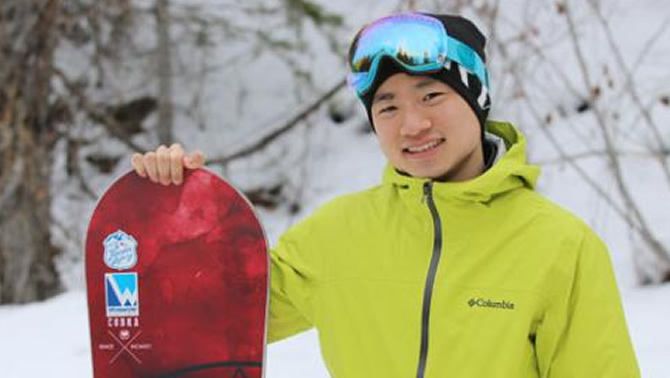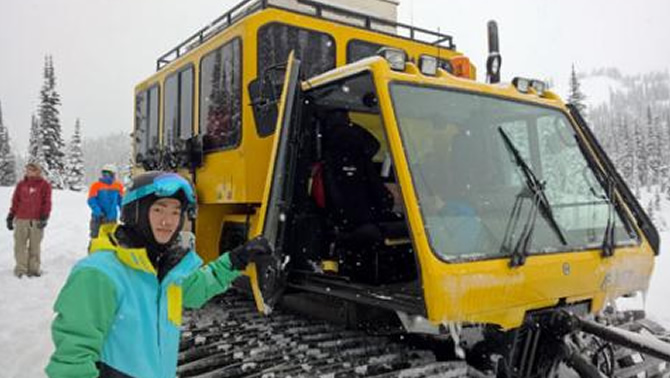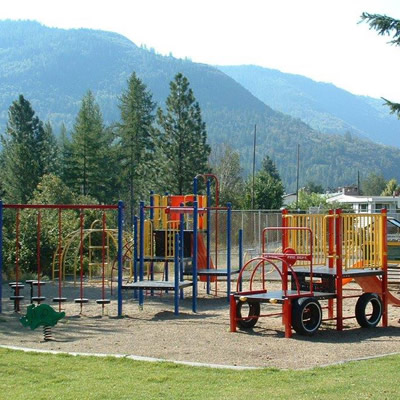Selkirk College connects to China’s massive ski industry
Falle says the program is attracting more experienced, higher-educated mature students, looking for a change or a new direction.

Yue “Max” Liang is a Selkirk College student who is in his first year of the Ski Resort Operations & Management Program (SROAM) based out of Nelson, B.C.’s Tenth Street Campus. Liang arrived to Canada from Beijing, China with a bachelor’s degree in engineering and is looking to change course to a career that brings new challenges and opportunities. — Photo courtesy Selkirk College
Fueled by the rise of a massive middle class, China’s ski industry has been expanding for more than a decade. Selkirk College’s Ski Resort Operations and Management Program allows students from Canada and around the world to learn the skills to capitalize on that growth.
Five years ago Yue “Max” Liang hated winter. He wasn’t too keen on his chosen profession either. But today he’s in love with snow and preparing for a career connected to China’s fast-growing ski industry. Selkirk College’s Ski Resort Operations & Management Program (SROAM) is helping him get there.
Liang remembers the lousy winters growing up in Beijing.
“It is too cold to stay outside, it is grey, and snow is rare,” says the 26-year-old. “People didn’t do much outside in the winter. I just hated the cold.”
Then one day a friend showed him a snowboarding video and the two went to a small ski hill near the city to give the sport a try.
“There was very few people on the hill, hardly any snowboarders,” Liang recalls.
It was a nice break from the crowded city. A day on the slopes, the fun and fresh air, sold him on the sport.
“I came home thinking, ‘I want to do more of this’,” he says.
Searching the World for a New Direction
That was five years ago. Liang was at a crossroads in other ways. He had a bachelor’s degree in engineering and master’s degree in business, but the prospect of a future in busy, polluted, crowded Beijing just didn’t inspire him.
“I decided I wanted to come to Canada. There was the clean environment, low population and good ski resorts,” he says. “I did some research, looking at colleges and universities when I found Selkirk’s Ski Resort Operations & Management Program. I thought, ‘oh, this is what I want to try’.”
“It’s exciting to have students like Max here,” says Bob Falle, the Chair of the School of Hospitality & Tourism.
Falle says the program is attracting more experienced, higher-educated mature students like Liang, looking for a change or a new direction in their careers. About one-third of the program’s 30 students are international, arriving from places as diverse as Brazil, Chile, Ukraine, Australia and Europe.
“They find us online. They see it’s both a business program—with courses in accounting, leadership, human resources, etc.—and it has ski-industry specific elements like snow-making, ski lift maintenance, heli- and cat-skiing, ski school and events management. That really appeals to people looking for a solid grounding in the industry.”
The solid grounding SROAM provides is just what ski resorts and tour operators are looking for, says one industry spokesman.
“This industry suffers from an ongoing labour shortage of skilled workers, especially in good years, like this one,” says David Lynn, the CEO of Canada West Ski Areas Association.
Lynn says the SROAM program has played a “pivotal” role in building relationships with Chinese resorts and Canadian companies looking to develop inroads in that country.
“Selkirk’s program is an important partner in providing a much-needed stream of young people educated for management skills,” he says.
Growing Demand in China for Winter Recreation
The potential for growth in the ski industry in China is staggering. The 2012 China Ski Study (a government and industry-sponsored survey) estimates that in 1996 there were just 10,000 skiers in China. In 2010 the number jumps to more than five million. From a handful of resorts in 1980, the country now has more than 75—many of them massive, multi-billion dollar projects. With China now set to host the 2022 Winter Olympics, the sport’s popularity is only expected to grow.
That growth, however, has also created significant challenges. As in Canada, there are critical shortages in trained resort managers in areas from retail sales to lift maintenance, from snow making to event planning. Most workers remain seasonal hires, with little or no training in hospitality service.
“We had two SROAM students go to Thaiwoo, a brand-new mountain resort north of Beijing for their work experience term this winter,” says Falle. “They ended up having to teach the resort’s ski patrol how to ski. And they are writing operating manuals and designing terrain parks. We’d get calls from them to the school, asking us to send manuals.”
That lack of industry knowledge amongst resort staff and quality service managers could have serious consequences. If the industry doesn’t up its game, it could hurt future growth. The 2012 China Ski Study also warns that the potential of the industry in China may have been “overstated,” with “many of China’s ski resorts… yet to meet visitor projections, and many developers have yet to see a return on their investments.”
“Many people in China now have money and the time for leisure,” says Falle. “They know what service levels to expect. But if they don’t have an enjoyable time skiing or snowboarding they are going to try it once, then go on to do something else.”

Liang and his fellow SROAM students spent three days of safety training in the mountains above Nelson in early-January where they spent time learning about the cat skiing element of the winter outdoor recreation industry. — Photo courtesy Selkirk College
Falle says the school is working with industry connections in China to increase opportunities for partnerships with resorts for training and business development, and work experience for Selkirk College SROAM students.
But students like Max can also capitalize on opportunities here in Canada for outbound Chinese ski tourists.
“We have continuous growth in Chinese adventure ski tourism here,” Falle says. “Vancouver is the number one gateway from China to North America for all categories of tourism and a lot of people are coming through here. Right now many are staying in large destination resorts such as Whistler/Blackcomb and the Banff resorts. In the very near future, I believe they’re going to start looking to the interior of B.C. for a new experience.”
Building Relationships in Asia
Falle will be heading to China in February with industry representatives to build more connections to Chinese resort operators and with the Canadian businesses looking to benefit from the boom.
Liang still has most of the program ahead of him. He’s just finished his first semester of SROAM and has another year-and-a-half to go. With so much opportunity in the industry, he’s keeping his options open for what he wants to do. After school he plans to apply for a work visa to build his business experience in this country.
“I think I can be a bridge, because I straddle the two worlds between China’s and Canada’s ski industries,” says Liang. “My life in Beijing gives me on-the-ground knowledge of the industry there and being here gives me Canadian industry knowledge. I can use both to establish my career.”
In the meantime, he’s following his dreams and finding in Nelson the life he wanted in Canada.
“Every morning, I climb the hill to school. I stop and look at the view—the lake, the mountains. It is so beautiful. I love being this close to nature,” he says. “And now when I take a deep breath of fresh cold air, I just say ‘wow.’”
Learn more about the Selkirk College Ski Resort Operations & Management Program and join us on Facebook.





Comments